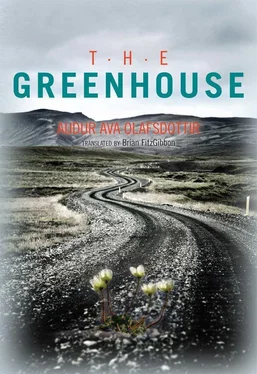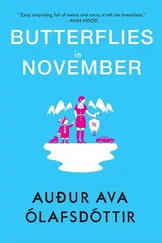— But she’s just a kid.
— You always agree with each other.
— What do you mean?
— You even speak Latin together. I feel I’m one too many.
— It’s a bit of an exaggeration to say she speaks Latin. She knows a few words, five or ten, I say, probably seven, I add after thinking it over a short moment. She just picked up a few words at the masses. Kids do things like that.
— Ten months old?
— Of course, I don’t have any experience of other children.
— I don’t get as much out of the mother role as you do out of the father role.
— Maybe I just wanted to attract your attention, to impress you.
— By teaching her Latin?
— By taking good care of her. And you, too, I say very softly.
— You’re a great guy, Arnljótur, she repeats, good and intelligent. Then she says she’s very fond of me.
— These forty days have been wonderful, she continues, but I can’t expect you to hang around waiting for me, she says, burying her face in her hands, while I’m finding myself, I mean.
— No, I say, you can’t. Still though, she could always try asking me to wait, I think to myself.

The last night is like a long and excessively slow memory. It’s a blue night, and I move cautiously in the bed to avoid waking Anna. She’s breathing deeply. I try to slow down my own breathing to bring it into sync with hers, without falling asleep myself. I’m right up against her, but no matter how tightly we lie together, there’s an ocean between us because we’re not one. I feel like I’m losing her like I lost Mom on the phone, like black sand running through my fingers, no, like a wave leaking through my fingers. And I’m left sitting there, licking my salty fingers.
I can’t sleep a wink, but instead try to slow down time and devise something that will stop her from leaving. I can’t lose Flóra Sól either. I feel like I have to guess something, anything really, to be able hold Anna back. I might unexpectedly get the right answer, like on those TV quizzes, and end up taking the jackpot home.
Hang on, hang on, hang on , I try to reason with myself. I feel like I’m in the middle of a swarm of crazy arctic terns, being assailed from all sides and unable to think of any way of protecting myself. Since I can’t chain myself to her like a pacifist to a tank, it occurs to me that I could maybe show her some place she would be unable to resist and that would make her quickly change her mind.
She has to get the train at nine, but at seven she’s still mine to hold, and I grope under the sheets, stalling the menace of the rising dawn. Day breaks through the curtains in the same violet as that of the skinned wild boar at the butcher’s. Then she’s suddenly awake and I haven’t slept all night. She seems confused. Our daughter is still sleeping soundly.
— I had a really weird dream, she says. I dreamed your were in new blue boots with Flóra Sól in your arms and she was also in identical new blue boots, except they were tiny. You were in the rose garden but there was no other color in the dream, not even the roses, just the blue boots. Then I was suddenly in a narrow alley and I could see you going up a long stairway and disappearing behind a door. I knocked on the door and you answered with Flóra Sól in your arms and invited me in for tea.
Then it just blurts out of me without warning:
— Maybe we’ll have another child together, later. I say this without daring to look at her.
— Yeah, she says. We might.
We both get out of bed. I’m standing right in front of the mirror and I take Anna’s arm and gently tow her until we’re both reflected in the mirror, like a studio family photograph, set in a carved gilded frame, as if we were formally acknowledging our forty days of cohabitation. I’m pale and skinny and she’s pale, too. Our daughter stands behind us, having just woken up in her cot, and smiling from ear to ear, with her rosy cheeks and dimples on her elbows, so the whole family is in frame now.
— You can have Flóra Sól, she says suddenly in a low voice, as if she were reading a new script for the first time, as if she were trying to fit the words to the circumstances. She’s looking me in the eye through the mirror.
I say nothing.
— When I see how well you get along and how responsible you are, then I know that I can leave her with you without any worries. Of course, I’ll always be her mom, but you don’t have to be worried about me turning up one day and taking her away from you. But I’ll still help you bring her up as best I can. I’d do anything for her, she ends up saying.
— Sorry, she says finally. She kisses me. Give me six months, she ends up saying.

Once we’ve had some bread with cheese, like school kids eating their picnic, sitting silently opposite each other and sharing an apple between us and the child, I stand up to clear away the breakfast while Anna gets her clothes and books together.
When she’s ready and standing in the corridor, she locks me in an embrace and I think she must be able to feel my heartbeat, which fills the room and the buzz in my ears. Then she hugs the child; she doesn’t want us to accompany her to the station. I’ve never been good at good-byes; I didn’t even say good-bye to Mom.
I’m left sitting alone with the child, and I dress her. Then we sit over the gardening book together at the table and skim to my daughter’s favorite chapter, the chapter on garden ponds and streams.
— Ma-ma, says the child.
— Yeah, Mammy will come back later.
We’re looking at the streams when there is a knock on the door.
I immediately dash toward the door, glance in the mirror, and run a hand through my hair. It’s my neighbor from upstairs. She’s holding a large steaming dish, which she hands me without saying a word. I make out various types of fish, including shellfish and crab’s claws, protruding from a base of beautiful yellow rice, baked tomatoes, and onion rings.
— I’ll be straight back, she says and disappears up the stairs.
I hold the door ajar with my foot and see that Flóra Sól is following me at a distance on her little feet to see the guest. She stands in her knitted leggings and props herself up against the door beside me.
— Good girl, I say, and have both hands tied now as I stand in the doorway with a steaming dish.
Our neighbor quickly reappears with a cherry cake that she says is the dessert. Her face radiates when she sees the child, and she swiftly puts the cake down on the kitchen table so that she can greet her. Flóra Sól is happy with the visit, too; we never have guests. She lets go of the sash of the door and totters unassisted across the floor to get a date from a bowl on the table. Then she follows the same path with it back across the floor to the woman and hands it to her.
— I thought I might give you this because the young lady is gone, says the old woman. The child has to eat, even though Mammy’s gone.
I thank the old woman for the food, for her warm heart, as I put it in her dialect, because I’ve been taking a look at the chapters on manners and customs. Still I’m slightly worried she might want to linger, since I was planning to take the child out to phone Dad.
When the old woman has finished her cup of tea, I put my daughter into her woolen coat with the double row of buttons and stitched pockets and outdoor shoes.
— Shall we ring Granddad Thórir?
— Gran-da.
Читать дальше













